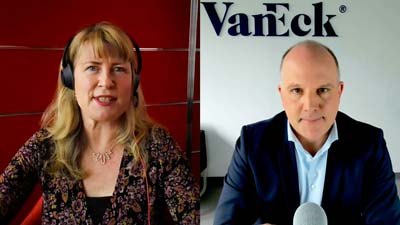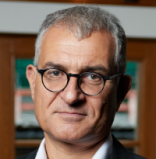Wealth Management has been the bedrock of the financial services industry for decades on end. Long immune to structural change, this high-margin business today is, however, facing increasing challenges to the core of its business model -- managing wealthy clients money in a highly personalized fashion and levying hefty fees. Several factors have contributed to the erosion of margins: Increasing regulatory pressure, rising compliance costs, the advent of new, disruptive technologies which have bred new competitors and, ultimately, the loss of client trust due to poor investment returns, to name a few.
The Morningstar Swiss Fund Awards 2017 in Zurich on March 29th were the host of an expert discussion on the future of wealth management with the title “Have we lost client focus?”, a joint effort with the think tank “Redesigning Financial Services” (RFS), a collaboration between the University of St. Gallen (HSG), the Swiss Federal Institute of Technology in Zürich (ETH) and the management consultancy EY which was set up to accelerate the structural transformation in the financial services industry. Morningstar has partnered up with RFS and is participating in the key research cluster “Wealth Advice”.
Fat cats of the past are getting slim fast
Five experts, all with a banking background, took to the stage to discuss the multiple aspects of the challenges facing the industry. Giles Keating, former Head of Global Research at Credit Suisse and currently President of the Werthstein Institute, an affiliate of the German-based robo-advisor Werthstein, predicted a painful consolidation for the incumbent players with pressure on margins set to increase. “The wealth management industry of the past thrived on a sweet spot. But it has not modernized and has now become inefficient, no longer delivering the service needed to justify high margins. Rapidly falling profitability will lead to the emergence of new business models”, Keating said. Among the challengers are new technology-driven players such as robo-advisors which are strong on the technology side. “Incumbents are hampered by the fact that running the legacy IT systems is very expensive which minimizes their capacity to innovate”, Keating maintained.

The panelists at the Morningstar Fund Awards Switzerland, from left to right: Robert Ruttmann (University St. Gallen), Eunice Zehnder (IPM AG), Lee Davidson (Morningstar), Jesse McWaters (World Economic Forum), Giles Keating (Werthstein Institute), Ali Masarwah (moderator, Morningstar).
However, the challenge of new fintechs is belittled by new actors entering the wealth management market who have thrived in other parts of the financial industry, such as asset managers and brokers. “Vanguard, having entered the market only in 2015, is now the largest robo-advisor in the world”, said Robert Ruttmann, Head of the Center of Customer Insight on Financial Services at the University of St. Gallen and RFS founder. The assets administered by the Vanguard Personal Advisor Services have increased from USD 17 billion in May 2015 to nearly USD 50 billion in February 2017. Vanguard is followed by the broker Schwab Intelligent Portfolios which manages more than USD 10 billion. By way of contrast, assets managed by pure-play robo-advisors are much more humble in size. The largest of the new players, the US platform Betterment, manages USD 7.4 billion. The largest non-US robo-advisor is British Nutmeg which has USD 800 million assets under management. The largest robo-advisor in the German-language countries is Scalable Capital (Munich) which manages around USD 100 million. However, this industry is set to grow rapidly. According to Ruttmann, robo-advisors could well grow by 150 % a year which would imply a volume USD 8 trillion of assets under management by the year 2020.
Incumbents versus newcomers: rethinking wealth management
Jesse McWaters, Project Lead of the study group on disruptive innovation in financial services at the World Economic Forum, illustrated the dimension of the technological challenges ahead: “The wealth management and asset management businesses will experience technology driven pressures for change at multiple points on the value chain”. For one, distribution channels for wealth management products will change, particularly for those products targeted at the mass market and affluent customers who have limited access to advice, according to McWaters. “Automated decision-making software will play an increased role and new players will enter as “platform” models of banking gain popularity”, he noted.
New technologies will enable process automation and externalization which will drive intense cost competition between wealth managers. “Human interactions will still play an important role, but equally important will be achieving the flexibly to deploy them only where and when important each client”, according to the WEF expert. Replacement of legacy capital markets infrastructure with new technologies, in particular leveraging blockchain, will also drive competition and consolidation of intermediaries, McWaters maintained. Even if robo-advisors are important challengers to the incumbents, Jesse McWaters does not rule out cooperation between both sides of the fence, an opinion which was debated hotly during the panel which illustrates the open nature of change process and its uncertain outcome.
Investors will be the main beneficiaries of consolidation
Lee Davidson, Head of quantitative Research at Morningstar, stressed the positive aspects of upcoming consolidation of the wealth management industry for clients who are will be the main beneficiaries of the margin compression in the industry which will be forced to lower fees in an unprecedented manner. Robotics Process Automation will probably be the overarching trend that has applications for many areas firms – data collections, compliance, banking activities. “In 2016, Bank of New York Mellon deployed hundreds of robot workers named Alex to replace hundreds of service jobs in their operations teams. These workers never tire, work 3 shifts, work many multiples faster than a human analyst, and, once trained, never make a mistake”, Davidson illustrated.
Machine learning will also cover other angles of the business. “The scalability of Research is another, often overlooked aspect. Embracing machines in the field of investment research and idea creation will be part of the story. The ideal service jobs to be automated are always those that have repeatable processes. Though tremendously complex, much of equity and fund research fits this pattern of repeatability”, said Davidson. For a long time, building algorithms to predict returns was the main thrust for machine learning, not replicating fundamental investing or research. “In these cases, the objective function is not returns, but the investment house’s process”, Davidson added.
And what about the emotional aspect of investing?
Eunice Zehnder, CEO of the Institute for Personality-Oriented Management (IPM), a Swiss management consultancy, added a new dimension to the debate: The personality of the investor and his – highly subjective – needs and motivations. “Money is an emotional topic. On the surface it appears purely rational, but at the end of the day, it is not only about the money, but the client’s emotional relationship with money. What matters is what the money gives them – peace of mind, security, freedom, independence, confidence, power, status, and maybe even vanity and fun”, Zehnder said. The emotional aspect of client relations typically runs counter to the tendencies of banks which tend to focus on selling products. “This leads to a transactional mindset and the client relationship often takes a backseat. In addition to delivering financial performance, a desirable wealth advisor needs to be a trusted sounding board”, Zehnder added. This aspect begs the question of whether the robo-advisors of today are up to the job of capturing the emotional side of money management for human clients with all their emotions and behavioral approaches to investing. Attentive industry observers will also remember that infrastructure-light robo-advisors were not always as available to address clients’ needs in the past. In the Summer of 2015, for example, many robo-advisors had a hard time when it came to addressing the concerns of investors nervous about melt-downs in their portfolios in volatile markets.
Conclusions: The implication of the upcoming changes are thus clear: More consolidation to come for the wealth management industry which is facing a structural consolidation process and not simply a cyclical downturn. “The implications of these longer-term developments for wealth managers are significant but still unclear”, was the conclusion of Jesse McWaters from the WEF.
Increasing competition is one thing, but the multiple paths open to the incumbent players and their ability to react should not be underestimated. According to Ruttmann, it will be essential for incumbents to maintain and manage its current business while simultaneously exploring new market opportunities in response to impending structural change. Players unable to adapt tend to be incumbents who dismiss new trends as inconsequential relative to established services. “Kodak offers a perfect example. It missed the shift to digital photography, leading to its bankruptcy in 2012.
In 1999, Kodak was the world’s largest camera and film producer, generating profits of over USD 2.5 billion. However, worldwide film sales declined rapidly in 2000. In response, Kodak focused on cost reductions to preserve its profitable film business, even cutting experimental divisions. This started a painful downward spiral. Meanwhile, Fujifilm followed a different path, employing a two-pronged strategy: while maintaining the profitable film business as long as possible, it successfully switched to digital by transferring existing expertise to new markets like flat-panel screens, cosmetics, and pharma. “This example illustrates the importance of organizational ambidexterity in the context of disruption”, Ruttmann maintained.

















